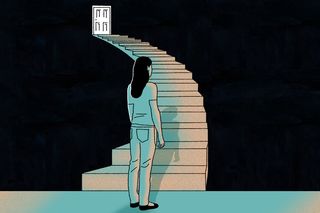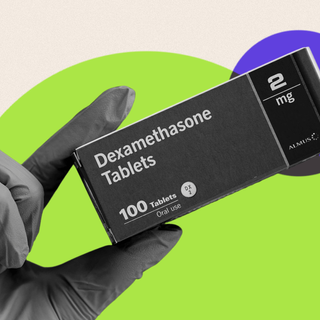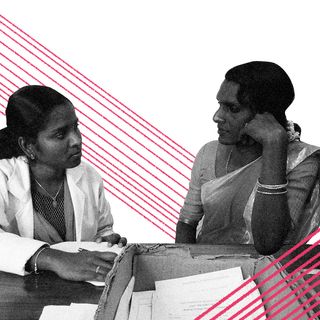
What It’s Like To Live With: Fibromyalgia
“The pains due to fibromyalgia were also just so much during this time that I struggled to even brush my teeth, or wash my hair.”

What It’s Like to Live With explores the stories of people who see and experience every day a little differently.
My first symptoms of fibromyalgia showed up while I was working as a lawyer in Mumbai. I was in my mid-20s then; [and] I was experiencing a lot of pain in my body. I went from doctor to doctor, but their opinions mostly boiled down to things like posture and stress. I underwent physiotherapy too. Then I went to an orthopedic, who finally did a whole-body MRI for me. Looking at the report, [he/she] told me there was nothing physically going on in my body that an orthopedic could treat.
Then, I went to a neurologist because I’d begun running out of options by that point. I had gone to see him alone. I wasn’t really told to bring someone with me, and I anyway lived independently in Mumbai, away from my family. He asked me to go through the “nerve conduction test” [used to measure how fast an electrical impulse can move through one’s nerve]. It turned out to be a really painful process for me — something I was never warned about. I didn’t even know what the test would entail. Anyway, this led to my diagnosis of fibromyalgia.
As relieved as I was to receive the diagnosis, it was a very, very isolating experience as a young person living alone in a big city. I had a lot of questions on my mind. But when I asked the doctor what having fibromyalgia means, or what the treatment plan will be like, he just said: “It will be nothing. You can just Google it. You don’t have to come back.” He was just not ready to take up my case — it was scary. And this was a renowned neurologist in Mumbai. I’d gone for good medical care all along. Even so, it was difficult to get a diagnosis for my condition, to begin with. Then, getting treatment also turned out to be very tricky.
Overall, I think it was quite traumatic. Even now, I don’t have a doctor specifically for fibromyalgia.
Because of the pains I used to experience, I had to quit my job. And a corporate law job can be extremely stressful of course. But when I quit work, I also had to move out of the city. It felt as if the life I’d built for myself had suddenly come to an end. I moved back with my parents. I live with bipolar disorder, too, and at this point, I was going through a depressive phase. The pains due to fibromyalgia were also just so much during this time that I struggled to even brush my teeth, or wash my hair — although I still can’t do the latter without having to deal with pain. But back then, I was struggling to do the most “basic” of things.
Then, with time, I learned how to manage my conditions better. I started taking better care of myself, got a less stressful job, made sure I get adequate rest — I sleep a lot, more than most people do. Since sleep disturbances are a common symptom of fibromyalgia, which I learned about online, you need to have good sleep hygiene. I also found support groups online. Gradually, all these things combined together really helped me. Now I’m much, much better than what I was then.
Related on The Swaddle:
No One Tells You Fibromyalgia Affects Your Sex Drive; They Should
It’s not like fibromyalgia doesn’t impact my life anymore though. I am on medication, but I’m hoping it can be phased out, at some point — unlike my medicines for bipolar disorder, which I possibly have to take all my life.
Thankfully, people at work are quite understanding as well. They’re really big on providing accommodations to people, too, whenever someone needs it. As long as I’m able to meet my goals, what time during the day I’m doing my work doesn’t really matter to them. If I’m having a bad time during the day, I can work at night. If I need to take time off to go see a doctor, I can do that too. There’s a lot of flexibility in my job, and that has really helped me. And given that I think it was possibly work-related stress that had triggered my fibromyalgia, this is definitely a plus.
In terms of romantic relationships though, there is a lot of discrimination to be faced by people living with a condition like fibromyalgia. It’s because as soon as your condition starts impacting your partner’s life in any way, they tend to call it quits — one of my major breakups was because of my health. For instance, I need to be in those areas, where I navigate by car. I can also never go on trips that might be hectic for my body — climbing stairs is also a painful exercise for me. My social participation is also lower now than it used to be. And during periods of anxiety and depression, I just don’t want to go out, I don’t want to mingle, so I become kind of a recluse. These things can affect the other person, and people don’t want to take that on.
To be completely honest, there’s a little bit of a caregiving role also that you have to play when you are in a relationship with someone living with invisible illnesses.
Having said that, I strongly feel that everyone has their own baggage, and their own set of issues, right? For some, it could be a bad workplace they’re dealing with, difficult family relations, or personality issues… things like that. My conditions, too, are just another set of issues. But the awareness about them is very limited.
Perhaps, if there was more awareness, more people would be willing to take on the responsibility of dating someone with conditions like mine, the same way they partner up with other people.
But I’m very lucky to have found friends who understand my conditions. My family, of course, has been very supportive too — in every possible way and for the longest time. From my end though, I try not to lean too heavily on any one member of the family because I feel it’s not fair. But from not understanding fibromyalgia to coming to terms with it, it has been a journey for all of us.
This interview has been condensed and edited for clarity. As told to Devrupa Rakshit by Swati Agarwal.
Devrupa Rakshit is an Associate Editor at The Swaddle. She is a lawyer by education, a poet by accident, a painter by shaukh, and autistic by birth. You can find her on Instagram @devruparakshit.
Related


Covid19 Drug Dexamethasone May Have ‘Little to No Benefit’ For Women, Suggests Research
